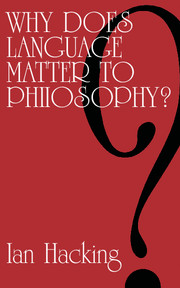5 - Nobody's theory of meaning
Published online by Cambridge University Press: 05 November 2012
Summary
Despite the excellence of Alston's classification of theories of meaning – ideational, referential, behavioural – we have seen how curiously difficult it is to pin any one of these on Hobbes and others. Yet we often experience little difficulty applying the same categories to modern philosophers. There is, I think, a good explanation. There is a proper sense of ‘theory of meaning’, which I shall now elucidate, in which none of our early empiricists undertook to provide well-worked-out theories of meaning at all. They did make many remarks which can variously be construed as supporting ideational, referential, or behavioural theories of meaning. But what modern philosophers call the theory of meaning did not matter much to them. Language did, avowedly, matter, but not necessarily in the ways that it has mattered of late. Our contemporaries often equate ‘philosophy of language’ and ‘theory of meaning’. At best, that is a poor anachronism to bring to historical studies; at worst, it is misguided even for current philosophical analysis. Language matters, but I suspect that meaning does not.
Let us have one more battle with the theory of ideas. It is intimately connected with language, for ‘words signify ideas’. If this doctrine were an ideational theory of meaning then the meaning of a word would be an idea; the meaning of a sentence, a thought that combines ideas or perhaps such a thought would itself be an idea.
- Type
- Chapter
- Information
- Why Does Language Matter to Philosophy? , pp. 43 - 54Publisher: Cambridge University PressPrint publication year: 1975
- 1
- Cited by

